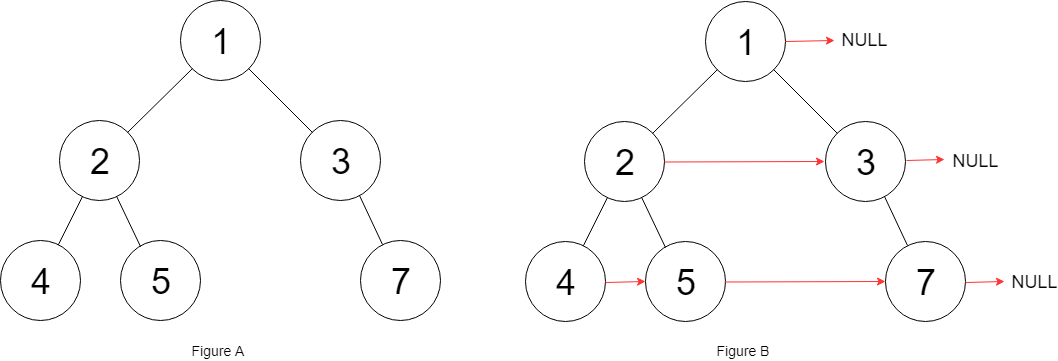Given a binary tree
struct Node {
int val;
Node *left;
Node *right;
Node *next;
}
Populate each next pointer to point to its next right node. If there is no next right node, the next pointer should be set to NULL.
Initially, all next pointers are set to NULL.
Example 1:
Input: root = [1,2,3,4,5,null,7] Output: [1,#,2,3,#,4,5,7,#] Explanation: Given the above binary tree (Figure A), your function should populate each next pointer to point to its next right node, just like in Figure B. The serialized output is in level order as connected by the next pointers, with '#' signifying the end of each level.
Example 2:
Input: root = [] Output: []
Constraints:
- The number of nodes in the tree is in the range
[0, 6000]. -100 <= Node.val <= 100
Follow-up:
- You may only use constant extra space.
- The recursive approach is fine. You may assume implicit stack space does not count as extra space for this problem.
"""
# Definition for a Node.
class Node:
def __init__(self, val: int = 0, left: 'Node' = None, right: 'Node' = None, next: 'Node' = None):
self.val = val
self.left = left
self.right = right
self.next = next
"""
class Solution:
def connect(self, root: 'Node') -> 'Node':
if root is None or (root.left is None and root.right is None):
return root
q = deque([root])
while q:
size = len(q)
cur = None
for _ in range(size):
node = q.popleft()
if node.right:
q.append(node.right)
if node.left:
q.append(node.left)
node.next = cur
cur = node
return root/*
// Definition for a Node.
class Node {
public int val;
public Node left;
public Node right;
public Node next;
public Node() {}
public Node(int _val) {
val = _val;
}
public Node(int _val, Node _left, Node _right, Node _next) {
val = _val;
left = _left;
right = _right;
next = _next;
}
};
*/
class Solution {
public Node connect(Node root) {
if (root == null || (root.left == null && root.right == null)) {
return root;
}
Deque<Node> q = new ArrayDeque<>();
q.offer(root);
while (!q.isEmpty()) {
Node cur = null;
for (int i = 0, n = q.size(); i < n; ++i) {
Node node = q.pollFirst();
if (node.right != null) {
q.offer(node.right);
}
if (node.left != null) {
q.offer(node.left);
}
node.next = cur;
cur = node;
}
}
return root;
}
}/*
// Definition for a Node.
class Node {
public:
int val;
Node* left;
Node* right;
Node* next;
Node() : val(0), left(NULL), right(NULL), next(NULL) {}
Node(int _val) : val(_val), left(NULL), right(NULL), next(NULL) {}
Node(int _val, Node* _left, Node* _right, Node* _next)
: val(_val), left(_left), right(_right), next(_next) {}
};
*/
class Solution {
public:
Node* connect(Node* root) {
if (!root || (!root->left && !root->right)) {
return root;
}
queue<Node*> q;
q.push(root);
while (!q.empty()) {
Node* cur = nullptr;
for (int i = 0, n = q.size(); i < n; ++i) {
Node* node = q.front();
q.pop();
if (node->right) {
q.push(node->right);
}
if (node->left) {
q.push(node->left);
}
node->next = cur;
cur = node;
}
}
return root;
}
};/**
* Definition for a Node.
* type Node struct {
* Val int
* Left *Node
* Right *Node
* Next *Node
* }
*/
func connect(root *Node) *Node {
if root == nil {
return nil
}
if root.Left != nil && root.Right != nil {
root.Left.Next = root.Right
}
if root.Left != nil && root.Right == nil {
root.Left.Next = getNext(root.Next)
}
if root.Right != nil {
root.Right.Next = getNext(root.Next)
}
connect(root.Right)
connect(root.Left)
return root
}
func getNext(node *Node) *Node {
for node != nil {
if node.Left != nil {
return node.Left
}
if node.Right != nil {
return node.Right
}
node = node.Next
}
return nil
}BFS:
/**
* Definition for Node.
* class Node {
* val: number
* left: Node | null
* right: Node | null
* next: Node | null
* constructor(val?: number, left?: Node, right?: Node, next?: Node) {
* this.val = (val===undefined ? 0 : val)
* this.left = (left===undefined ? null : left)
* this.right = (right===undefined ? null : right)
* this.next = (next===undefined ? null : next)
* }
* }
*/
function connect(root: Node | null): Node | null {
if (root == null) {
return root;
}
const queue = [root];
while (queue.length !== 0) {
const n = queue.length;
let pre = null;
for (let i = 0; i < n; i++) {
const node = queue.shift();
node.next = pre;
pre = node;
const { left, right } = node;
right && queue.push(right);
left && queue.push(left);
}
}
return root;
}DFS:
/**
* Definition for Node.
* class Node {
* val: number
* left: Node | null
* right: Node | null
* next: Node | null
* constructor(val?: number, left?: Node, right?: Node, next?: Node) {
* this.val = (val===undefined ? 0 : val)
* this.left = (left===undefined ? null : left)
* this.right = (right===undefined ? null : right)
* this.next = (next===undefined ? null : next)
* }
* }
*/
const find = (root: Node | null): Node | null => {
if (root == null) {
return root;
}
const { left, right, next } = root;
return left || right || find(next);
};
function connect(root: Node | null): Node | null {
if (root == null) {
return root;
}
const { left, right, next } = root;
if (left != null) {
if (right != null) {
left.next = right;
} else {
left.next = find(next);
}
}
if (right != null) {
right.next = find(next);
}
connect(right);
connect(left);
return root;
}
